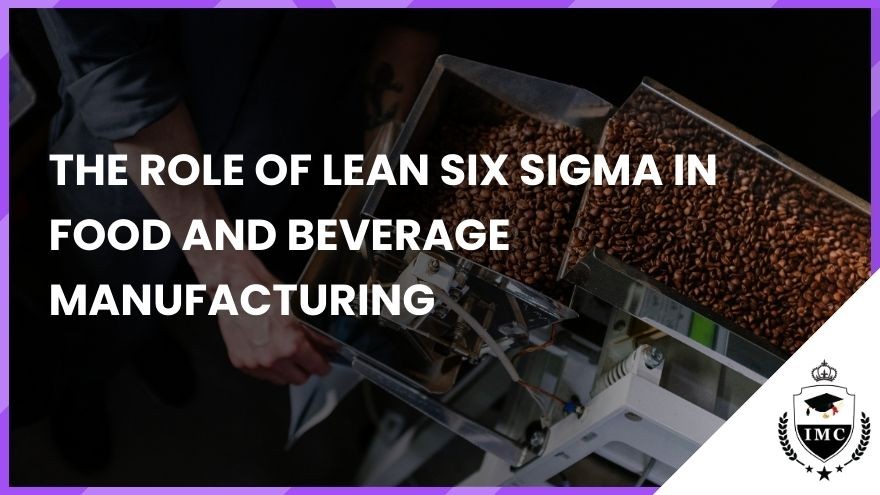In food and beverage manufacturing industry, efficiency, quality, and consistency are non-negotiable. From ensuring food safety to optimizing production processes, manufacturers face constant challenges to meet customer demands while maintaining profitability. This is where Lean Six Sigma steps in as a powerful methodology, combining Lean principles (focused on eliminating waste) with Six Sigma techniques (centered on reducing defects and variability).
By adopting Lean Six Sigma, food and beverage manufacturers can streamline operations, improve product quality, and significantly reduce costs—transforming challenges into opportunities for growth. In this blog, we'll explore the pivotal role of Lean Six Sigma in the food and beverage sector, with real-world examples, and introduce you to IMC Institute’s comprehensive certification programs, including a 50% combo discount on Lean Six Sigma and PMP certifications.
What Is Lean Six Sigma?
Lean Six Sigma is a data-driven methodology designed to enhance efficiency and quality in processes. It integrates two proven approaches:
- Lean: Focuses on eliminating waste in processes (e.g., excess inventory, unnecessary steps, and downtime).
- Six Sigma: Aims to minimize defects and inconsistencies using statistical tools to achieve near-perfect outcomes.
Together, these principles provide a structured framework for solving problems and achieving sustainable improvements in various industries, including food and beverage manufacturing.
The Importance of Lean Six Sigma in Food and Beverage Manufacturing
Food and beverage manufacturers operate in an environment that demands precision and agility. The slightest error in production or packaging can lead to financial losses, food recalls, and reputational damage. Lean Six Sigma offers solutions to these challenges by:
- Enhancing Food Safety and Compliance
- Regulatory compliance with food safety standards like HACCP and ISO 22000 is critical. Lean Six Sigma helps identify potential risks in production processes and implements controls to minimize contamination and ensure compliance.
- Reducing Waste
- Waste in food manufacturing comes in various forms, such as overproduction, unused raw materials, or packaging defects. Lean tools like Value Stream Mapping (VSM) help identify bottlenecks and eliminate unnecessary steps, saving time and resources.
- Improving Product Quality
- Variability in product quality can harm customer satisfaction. Six Sigma techniques like DMAIC (Define, Measure, Analyze, Improve, Control) allow manufacturers to pinpoint root causes of defects and establish standardized processes to maintain consistency.
- Boosting Efficiency
- Inefficient equipment setups, long changeover times, and unoptimized workflows lead to delays. Lean Six Sigma introduces techniques like SMED (Single-Minute Exchange of Dies) to reduce setup times and enhance operational efficiency.
Real-World Examples of Lean Six Sigma in Food and Beverage Manufacturing
1. Coca-Cola: Improving Production Quality
Coca-Cola used Lean Six Sigma to improve its bottling process by reducing defects in filling and capping. By identifying root causes using Six Sigma tools and implementing preventive measures, the company significantly improved production quality while reducing waste and costs.
2. Nestlé: Reducing Energy Consumption
Nestlé adopted Lean Six Sigma to address high energy consumption in its manufacturing plants. By analyzing data and optimizing equipment usage, the company achieved energy savings of up to 15% across its global facilities.
3. Kraft Heinz: Enhancing Supply Chain Efficiency
Kraft Heinz utilized Lean Six Sigma to optimize its supply chain processes, reducing inventory costs and improving delivery timelines. This enabled the company to better meet customer demands while minimizing waste.
How IMC Institute Can Help You Master Lean Six Sigma
At IMC Institute, we offer comprehensive Lean Six Sigma certification programs designed to equip professionals with the tools and knowledge needed to drive process improvements in any industry. Our certifications include:
- Yellow Belt: For beginners looking to understand the basics of Lean Six Sigma.
- Green Belt: For professionals who want to lead improvement projects.
- Black Belt: For experts aiming to manage large-scale, cross-functional projects.
- Master Black Belt: For seasoned professionals guiding strategic implementations.
Combo Offer: Lean Six Sigma + PMP Certification
In addition to Lean Six Sigma, IMC Institute offers the PMP Certification accredited by PMI, a globally recognized credential for project management professionals.
Why Choose the Combo?
- Lean Six Sigma enhances your problem-solving and process improvement skills.
- PMP focuses on project management techniques to execute projects successfully.
When combined, these certifications provide a comprehensive skill set to tackle complex challenges in food and beverage manufacturing or any other industry.
Special Offer: 50% Discount
Enroll in both Lean Six Sigma and PMP certifications with IMC Institute and get a 50% discount. This combo offer is perfect for professionals looking to upskill and advance their careers.
Summary
The food and beverage manufacturing industry faces constant pressure to deliver high-quality products efficiently. Lean Six Sigma offers a proven methodology to address these challenges, driving improvements in safety, quality, and efficiency. By earning a Lean Six Sigma certification, you position yourself as a valuable asset in this dynamic sector.
At IMC Institute, we are committed to helping professionals achieve excellence through our comprehensive Lean Six Sigma and PMP certification programs. Take advantage of our 50% combo discount and set yourself apart as a leader in process improvement and project management.
Start your journey today—visit imcinstitute.ae to learn more about our programs and enroll now!






